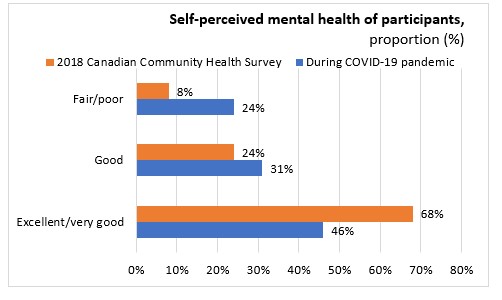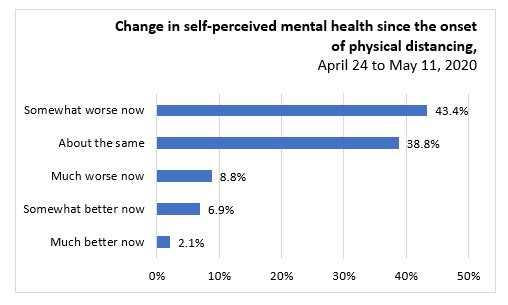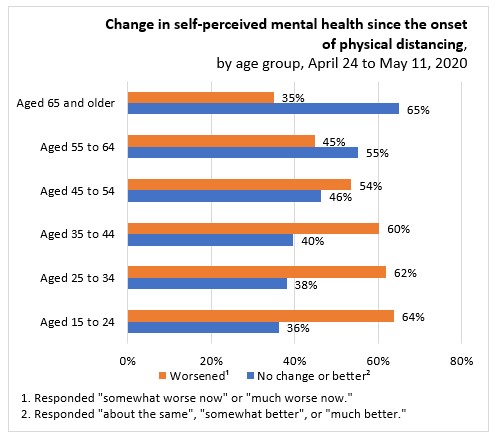The Economics and Statistics Division maintains archives of previous publications for accountability purposes, but makes no updates to keep these documents current with the latest data revisions from Statistics Canada. As a result, information in older documents may not be accurate. Please exercise caution when referring to older documents. For the latest information and historical data, please contact the individual listed to the right.
<--- Return to Archive
For additional information relating to this article, please contact:
May 27, 2020CANADIANS' MENTAL HEALTH DURING THE COVID-19 PANDEMIC Statistics Canada developed a new web panel survey to get timely information about how Canadians are coping with COVID-19. From April 24 to May 1, 2020, approximately 46,000 Canadians responded to the online questionnaire "Impacts of COVID-19 on Canadians: Your mental health." This release focuses on the results of this crowdsourcing questionnaire.

Almost one in four of the participants (24%) reported fair or poor mental health while 31 per cent reported good mental health during this period and 46 per cent reported very good or excellent mental health.
While the results of the crowdsourcing data are not directly comparable to population estimates from a sample survey, previously published data from the 2018 Canadian Community Health Survey found that 8 per cent of Canadians reported fair or poor mental health, 24 per cent reported good mental health, and 68 per cent reported very good or excellent mental health.

When asked how their mental health has changed since physical distancing measures were put in place, 52 per cent of participants indicated that their mental health was either somewhat worse (43.4%) or much worse (8.8%). 39 per cent of participants indicated their mental health was about the same while 7 per cent of respondents indicating somewhat better mental health. Just over 2 per cent of participants their mental health was much better during the period from April 24 to May 1, 2020.
Most participants (88%) reported experiencing at least one symptom of anxiety in the two weeks prior to completing the survey. The most commonly reported symptom of anxiety was "feeling nervous, anxious or on edge" (71%). This was followed by 69 per cent of participants indicating "becoming easily annoyed or irritable", and 64 per cent reporting "trouble relaxing".
Anxiety was measured using the GAD-7 scale, which is used in population health surveys to identify probable cases of generalized anxiety disorder (GAD) as well as to measure the severity of anxiety symptoms. Among those who said their mental health is worse since physical distancing began, 41 per cent reported symptoms consistent with moderate or severe anxiety.
43 per cent of participants who indicated significant impacts on their ability to meet financial obligations reported symptoms that were consistent with moderate or severe anxiety. Among those who reported that it was "too soon to tell" if the COVID-19 pandemic had an impact on their financial status, about one-third (32%) reported symptoms consistent with moderate or severe anxiety.

Youth were the most likely age group to report a negative impact on their mental health since physical distancing began while seniors were the least likely to do so. Almost two-thirds (64%) of those aged 15 to 24 reported a negative impact on their mental health, while just over one-third (35%) of those aged 65 and older reported a negative impact on their mental health since physical distancing began.
These results were consistent with earlier results released by Statistics Canada's "Canadian Perspective Survey Series 1: Impacts of COVID-19," which found that every age group except seniors was less likely to report excellent or very good mental health during the COVID-19 pandemic compared with rates prior to the pandemic.
When asked about stress levels on most days, 6 per cent of participants reported no stress while 66 per cent reported lower levels of stress and 28 per cent of participants reported high stress.
Source: Statistics Canada. Canadians' mental health during the COVID-19 pandemic
<--- Return to Archive